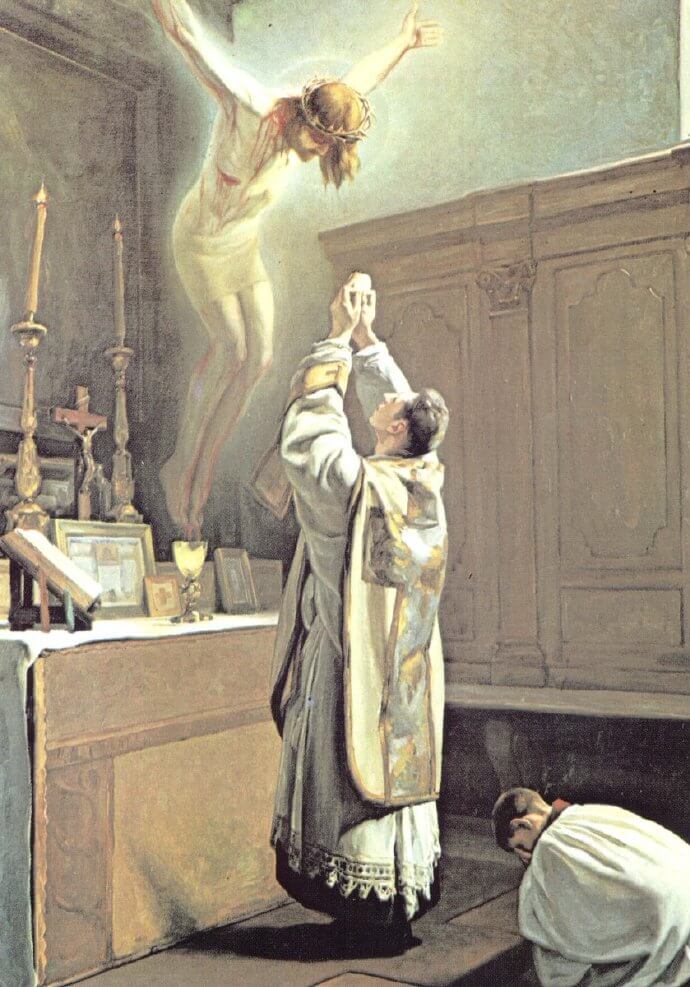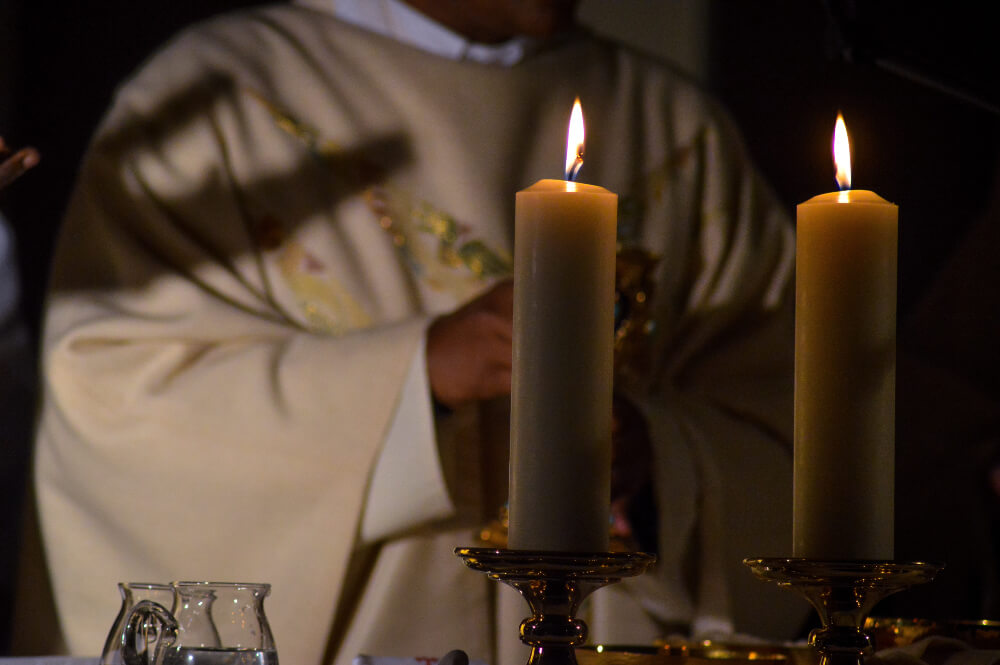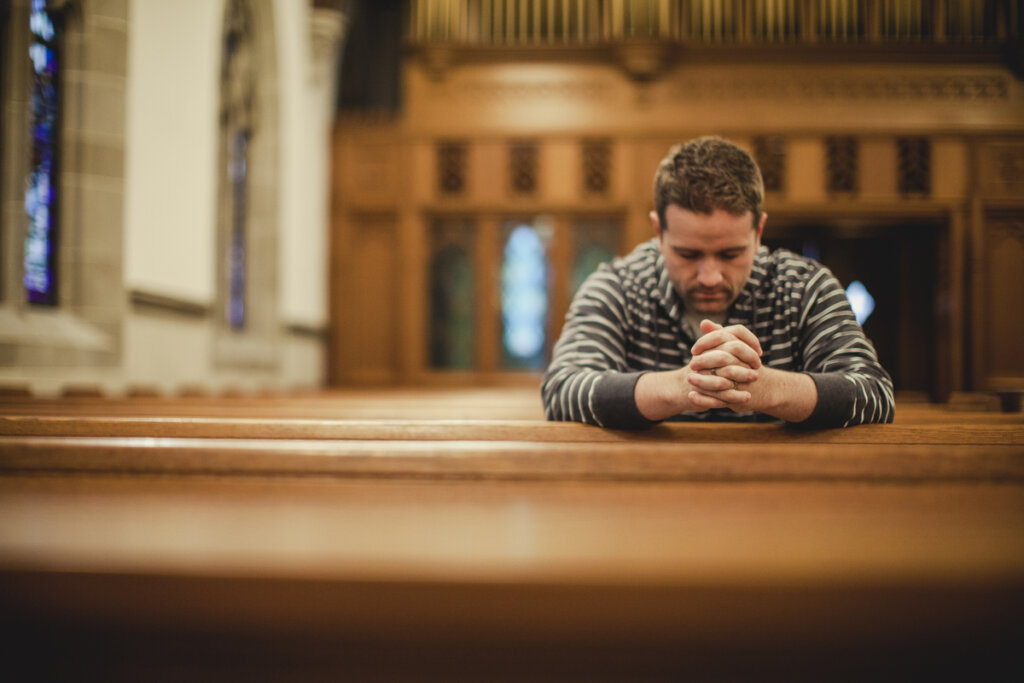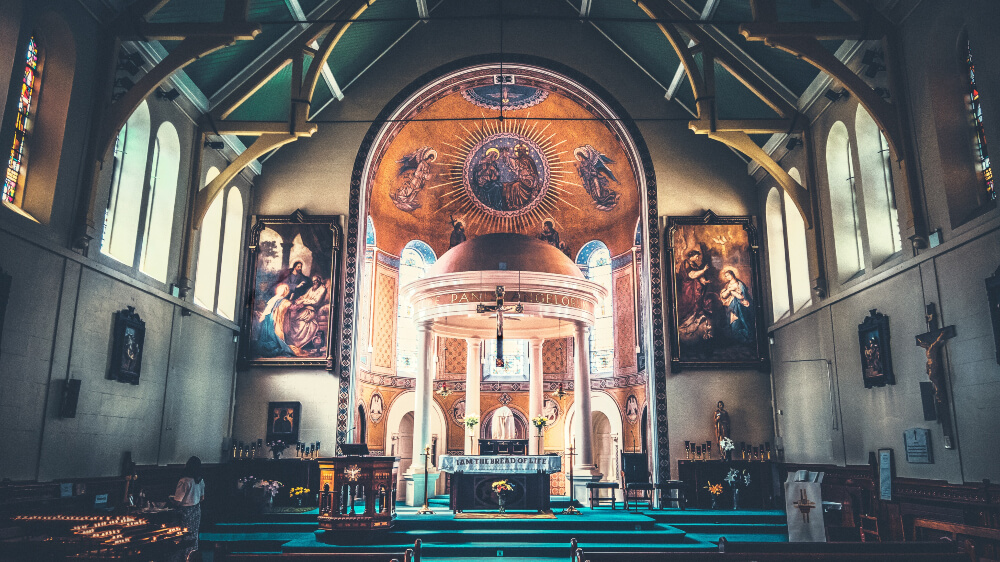
As members of the Catholic laity, we often hear about “active participation” at the Holy Sacrifice of the Mass.
We may think that “active” participation means “physical” participation—such as being a cantor, a lector, an Extraordinary Minister of Holy Communion, or even standing and kneeling at the right moments.
However, first and foremost, the active participation of the laity refers to our interior participation at Mass. As discussed in our devotional series School of Prayer, if we do not pray with attention and devotion, we do not pray at all. Our interior participation at Mass is the most important.
What Happens at Each Mass

Each Mass takes us to the foot of the Cross, where the sacrifice of Jesus Christ to God the Father (made on our behalf two thousand years ago) is made present to us.
In addition to “praying the Mass” with an engaged mind and heart, we also actively participate by joining (offering up) our own sacrifices and intentions.
This is a privilege we have as Catholics because we have been united to Christ through the sacrament of baptism. He is the head of the Church, and we are His Body. This allows us to participate in Jesus’ offices of priest, prophet, and king.
According to the dogmatic constitution Lumen Gentium:
The baptized, by regeneration and the anointing of the Holy Spirit, are consecrated as a spiritual house and a holy priesthood, in order that…they may offer spiritual sacrifices…
The ministerial priest, by the sacred power he enjoys, teaches and rules the priestly people; acting in the person of Christ, he makes present the Eucharistic sacrifice, and offers it to God in the name of all the people.
But the faithful, in virtue of their royal priesthood, join in the offering of the Eucharist. …Taking part in the Eucharistic sacrifice, which is the fount and apex of the whole Christian life, they offer the Divine Victim to God, and offer themselves along with It.
How to Offer Up Your Intention at Mass
The laity exercise their priestly role by offering themselves as a sacrifice to God in union with Jesus Christ.
Just as the priest offers the Holy Sacrifice for a particular intention, we, too, can offer it for a personal intention. To do so is to apply the infinite, redeeming Blood of Jesus Christ to a particular person or cause.

The place in the Mass where this happens is the Offertory, which immediately follows the Prayers of the Faithful. The bread and wine are brought to the altar, and the priest begins the preparation and blessing of the gifts. When he uncovers the paten, we can mentally place our intentions on the host.
The priest says: “Pray, brethren, that my sacrifice and yours may be acceptable to God, the almighty Father.”
The phrase “and yours” refers to our personal sacrifices and intentions that we unite with the one sacrifice of Christ.
The people reply: “May the Lord accept the sacrifice at your hands, for the praise and glory of His name, for our good and the good of all His holy Church.”
Then the priest prays over the offerings (including ours) after which the people say, “Amen.”
Jesus then presents our sacrifices and intentions to God the Father, who looks on us with favor because we have united ourselves to His Son.
What a gift each Mass is, for this fact alone!
What Intention Should You Make?
Your Mass intention can be anything that you would normally pray for.
For example, your family or friends; those who have asked you to pray for a special intention; help with a personal problem; the salvation of souls; to receive a special grace; to overcome a particular sin; for a particular apostolate or ministry, and so on.
You Can Also Offer Up Your Holy Communion
Although Holy Mass and Holy Communion are united, they can be participated in separately. A Catholic can participate in the Mass without receiving Holy Communion (for example, in fulfilling the Sunday obligation while unable to receive Holy Communion due to sins that need to be confessed), and a Catholic can receive Holy Communion without actually attending Mass (for example, if they are confined to a hospital or nursing home).
This means that if we both attend Mass and receive Holy Communion, there are two moments in which we can insert our personal intentions.

Our intention does not have to be the same for both. For example, you could offer Mass out of charity for another person, and offer your Holy Communion for a personal need.
When we receive Jesus in Holy Communion (the most intimate moment with God that we can experience in this life) we can imagine Him asking us, “What can I do for you?” This is the moment when we pour out our hearts to Him.
What If You Forget to Make an Intention?
If you forget to offer an intention at Mass or Holy Communion, one priest has suggested that we settle upon a “default intention.” You can make a resolution (an act of the will before God) that any Mass or Holy Communion for which you forget to make a special intention will be offered for a general intention.
For example, you could make your general intention for the Holy Souls in Purgatory; for the sanctification of the Church; for holy vocations to the priesthood and religious life; for your country; for the grace of a holy death; or simply defer it to the Immaculate Heart of Mary to choose as she knows best.
Don’t Forget to Make an Act of Thanksgiving
There is so much good that a Catholic can bestow on this world through the offering up of Masses and Communions! We must not neglect the gratitude we owe to God for the incredible privilege of being priests, prophets, and kings.

It is important to remain a few minutes after Mass to offer God prayers of thanksgiving after having made our intentions. Most Roman Missals include prayers to recite before and after receiving Holy Communion, such as this prayer to the Holy Trinity:
May the tribute of my humble ministry be pleasing to you, Holy Trinity. Grant that the sacrifice which I—unworthy as I am—have offered in the presence of your majesty, may be acceptable to you. Through your mercy may it bring forgiveness to me and to all for whom I have offered it: through Christ our Lord. Amen.
Life is short. We only get a limited number of opportunities to participate in the Mass and to receive Holy Communion in this life. We must make good use of these precious gifts, and not miss out on our chances to apply the infinite merits of Jesus to ourselves and those we love.
The more Masses we attend during the week, the more opportunity we have to receive His graces.
If you are interested in learning more about the incredible graces hidden in the Mass, you will love the series The Holy Mass. Sign up today and discover the wondrous treasures of the sacred liturgy.
